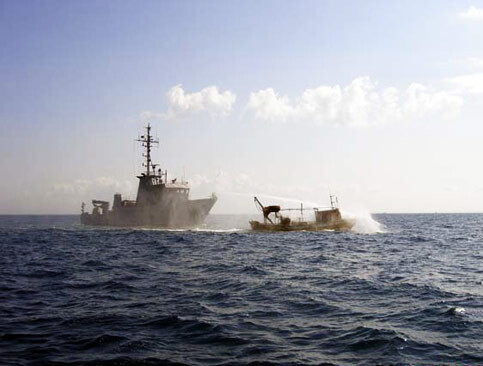The Electronic Intifada 13 July 2009

Israeli naval ships often attack Palestinian fishing boats off the coast of the Gaza Strip. (David Schermerhorn)
When the Israeli navy seized a small humanitarian boat flying under the Greek flag on Tuesday, 30 June, did the commandos commit acts of piracy when they forced the crew and 21 passengers — including a former US Congresswoman and Nobel Laureate — to port in Israel? May Israeli officials be prosecuted, and if so where?
On the morning of 29 June, the Spirit of Humanity set sail from Cyprus to the Gaza Strip carrying approximately three tons of medical aid, olive saplings, children’s toys and other humanitarian items for the area’s 1.5 million residents. The Spirit traveled through international waters when, at approximately 1:30am, several Israeli gunships surrounded the boat, jammed its GPS, navigation and radar systems and threatened to open fire. Heavily-armed Israeli naval commandos boarded the boat, ordered the Spirit’s passengers to lie face down, roughed up several, and ultimately forced the humanitarian volunteers to Israel where they were held for days in hot, crowded, cells before all but two (both Israeli citizens) were ultimately deported.
The Israeli navy routinely harasses Palestinian fishing boats off the coast of Gaza, and has on occasion seized boats and detained their crews , just as it did with the Spirit of Humanity.
An act of piracy, as defined by the law of nations, includes illegal acts of violence or detention committed on the high seas or outside the jurisdiction of any state. While today piracy often conjures up ideas of buried treasure, sunken ships and Johnny Depp at his best; olden-day pirates instilled a sense of terror in seafarers traveling in no-man’s zones, outside the protection of any state.
Israel’s commandeering of the Spirit last week shares a lot in common with these traditional acts of piracy: the Spirit’s unarmed passengers traveled on the high seas, vulnerable, uncertain if they would live or die when the Israeli navy surrounded them and took them prisoners. But do Israel’s actions constitute piracy? The answer is: Yes.
Israel committed clear acts of violence and detention against the Spirit’s passengers, acts, which, under the UN Convention on the High Seas, are unlawful. A warship may legitimately board a foreign ship on the high seas in only three circumstances: there is reason to believe the boat was engaged in piracy, the slave trade or the boat — despite its flag — is really of the same nationality as the warship. None of these circumstances apply here.
According to a 1 July press release from the Free Gaza Movement, the Spirit of Humanity was in international waters when the Israeli navy captured it. However, even if the boat was in Gazan waters, the above acts still constitute piracy because Gazan waters are outside the jurisdiction of any state — and certainly outside Israel’s jurisdiction. Jurisdiction, it should be noted, is different from control. While Israel exercises de facto control over Gaza, it has no legal de jure jurisdiction over Gaza.
Furthermore, while piracy has traditionally been defined as a private act, there is no reason why Israel’s seizure of the Spirit, its passengers and its humanitarian cargo should not be considered an act of state or state-sponsored piracy.
Israel committed an act of piracy by hijacking the Spirit, forcing its passengers to Israel, imprisoning them and taking their cargo and personal items. But why is it important that Israel be charged with piracy, especially when it already faces a host of new war crimes accusations?
The law of nations has long upheld the principle that pirates are “hostis humani generis” — an “enemy of all mankind.” In the 18th century, nations reached a consensus that piracy was universally wrong and every nation has a right to prosecute pirates of any nationality. In United States v. Smith, 18 U.S. 153 (1820), the US Supreme Court held that the principle of universal jurisdiction applies to punishing all persons, whether “natives or foreigners, who have committed [piracy] against any persons whatsoever ….”
In other words, piracy was one of the first criminal acts recognized by international law. Today, international law confers on piracy, along with slavery and genocide, the status of a jus cogens — a norm or a right that can never be derogated. This means a state is bound by a jus cogens norm whether or not it consents to its application. As an example, a country may not engage in slavery simply because it has enacted laws making it permissible to do so.
Filing indictments against Israeli government officials and senior army commanders for crimes related to piracy is important not only because the perpetrators of the 30 June hijacking must be brought to justice, but also to reinforce the legitimacy of international law, which is increasingly viewed as being selectively used by rich countries as a tool to oppress poorer ones. The War on Piracy has been highlighted most recently by UN Security Resolution 1851, initiated by the US, which calls on all states to actively take part in the fight against piracy off the coast of Somalia, and even authorizes states to take measures inside Somalia.
The laws of piracy should not be selectively applied to poor Africans who hijack huge tankers belonging to rich corporations. Just as US prosecutors in the Southern District of New York indicted a Somali national on ten counts including piracy and hijacking, similar charges should be brought against the Israelis who committed, aided and abetted in the 30 June act of piracy and any others against Palestinian vessels. But more importantly, governments and international civil society must do all they can to pull Israel back into the bounds of international law and truly support the self-determination and human rights of all peoples, including Palestinians.
Radhika Sainath is a Los Angeles-based civil rights attorney. She recently returned from a National Lawyers Guild fact-finding mission to the Gaza Strip and is an editor and author of Peace Under Fire: Israel/Palestine and the International Solidarity Movement.
Related Links
- The crimes we witnessed in Gaza, Radhika Sainath (20 March 2009)
- Free Gaza Movement





